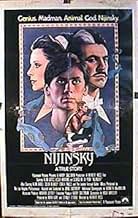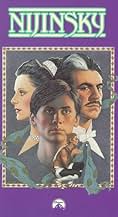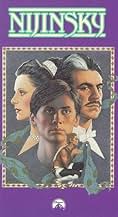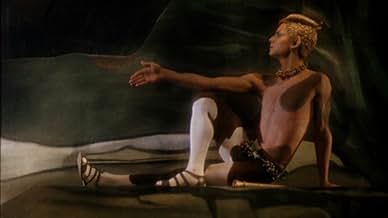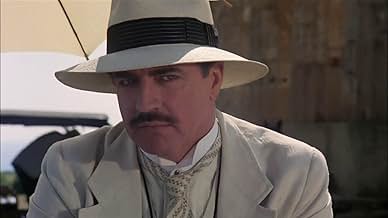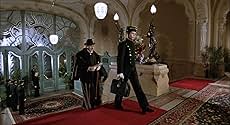Agrega una trama en tu idiomaThe story of Vaslav Nijinsky, who is widely believed to be one of the greatest ballet dancers of all time. Based on Romola Nijinsky's "Last Years Of Nijinski.The story of Vaslav Nijinsky, who is widely believed to be one of the greatest ballet dancers of all time. Based on Romola Nijinsky's "Last Years Of Nijinski.The story of Vaslav Nijinsky, who is widely believed to be one of the greatest ballet dancers of all time. Based on Romola Nijinsky's "Last Years Of Nijinski.
- Dirección
- Guionistas
- Elenco
Tomaso Milian Jr.
- Young Boy on Beach
- (as Tomas Milian Jr)
- Dirección
- Guionistas
- Todo el elenco y el equipo
- Producción, taquilla y más en IMDbPro
Opiniones destacadas
Acclaimed ballet dancer Vaslav Nijinsky, the "Polish peasant" who became the toast of Europe in the early 1900s, isn't very well served by this meandering biography which looks and sounds good but seems internally stultified. Nijinsky (played as a spoiled child by newcomer George De La Pena) attempts to extend his talents to the choreography of his latest showcase, under the tutelage of his lover and partner Sergei Diaghilev (Alan Bates), but cracks under the enormous pressure to be brilliant; meanwhile, a budding ballerina schemes her way into Nijinsky's arms after the star and his impresario have a romantic falling-out. Director Herbert Ross, apparently still riding the high from his 1977 ballet-themed drama "The Turning Point", has no new ideas on how to stage an electrifying or kinetic dance performance; the music direction is strong, however the magic of a timeless presentation is missing (what should have been the movie's strongest asset is in fact its weakest link). The temperament of artists in general is well-observed (if a bit over-the-top), however the love story between dancer and producer fails to come off. 1980 may still have been too early in the game to show passion between two men; Ross gives us a chaste rendering of it, followed by what seems like years of sniping and jealousy between the couple. Leslie Browne (a hold-over from "The Turning Point") never begins to suggest the cunning ambitions of a woman who hoped to 'change' Nijinsky', while the passion in that heterosexual union is confined to a single scene. What was everyone so bashful about? A brilliant little light show during the end credits is far more sparkling than anything in the rest of the film! *1/2 from ****
Purportedly factual biography of head strong and gay ballet dancer Nijinsky (George De La Pena). It deals with his slow descent into madness and his love for his manager (Alan Bates).
Lavish, well-done movie. I saw it way back in 1980 on opening night in a huge theatre in Boston. It was virtually empty. It was publicized to the hilt but it seems nobody had an interest in a ballet movie. Too bad. It was well-acted and the dancing by Pena was just superb.
My only complaint is the ridiculous R rating. It was given that because of a few (mild) kisses between Pena and Bates. Back in 1980 male on male kisses was enough to give a film an R rating and Hollywood wouldn't go any farther in portraying a gay relationship (purportedly Pena, who is straight, was petrified of doing these scenes). Everything else is PG material here. The rating really should be lowered for wider acceptance.
Worth catching.
Lavish, well-done movie. I saw it way back in 1980 on opening night in a huge theatre in Boston. It was virtually empty. It was publicized to the hilt but it seems nobody had an interest in a ballet movie. Too bad. It was well-acted and the dancing by Pena was just superb.
My only complaint is the ridiculous R rating. It was given that because of a few (mild) kisses between Pena and Bates. Back in 1980 male on male kisses was enough to give a film an R rating and Hollywood wouldn't go any farther in portraying a gay relationship (purportedly Pena, who is straight, was petrified of doing these scenes). Everything else is PG material here. The rating really should be lowered for wider acceptance.
Worth catching.
I consider this film a failure. It fails at being a good biopic about Nijinsky, as the facts are far too skewed in this telling. Part of this is because source material was sorely limited at the time, but it doesn't even match up with what was available. It fails at being a dance movie, as what little ballet is shown is unfortunately not filmed very well, with the worst offense being a choppy slow motion effect that ruins the climactic leap at the end of Spectre of the Rose. I can't fathom why the director, a former choreographer, would make such a stupid choice.
Those of you saying this film was "brave" for attempting to portray a gay romance on screen in 1980 - did we watch the same movie? The only kiss between two men in this involves a goofy and obvious gimmick with a tissue to avoid censorship, and besides that the relationship between the real Diaghilev and Nijinsky was far from romantic. It was an exploitative business transaction that quickly soured when Nijinsky decided to marry.
The film tries to cover a period of ten years in just two hours, which leads to idiotic insinuations, such as Nijinsky going mad because he sexually repressed himself, or because his brother was "insane" . The man was a schizophrenic; nothing specific actually caused his illness. The stress of not being able to find work after Diaghilev fired him for marrying Romola likely did exacerbate it along with other factors. But the fact remains that he was married to her for five years and had a child by her before he was institutionalized; saying he went crazy because of their marriage is ridiculous.
Okay, I'll throw the non-history buffs a bone. I know that most biopics play fast and loose with the truth, but this movie is just not good or enjoyable to watch even as a piece of entertainment. The acting is often melodramatic to the point of being cringe-worthy. Alan Bates as Diaghilev is good, but George de la Pena and Leslie Browne are very poorly cast as an overwrought Nijinsky and simpering Romola. The script contains a lot of really dumb moments (I laughed hysterically during the film's only "sex scene" which is soundtracked with Stravinsky's The Rite of Spring, as well as the cabin-trashing scene that is reminiscent of Tommy Wiseau's The Room), scenes which don't make a whole lot of sense, and throwaway lines which don't factor into the plot or mean anything later. Nijinsky kisses his female ballet partner (who is presented as an amalgam fulfilling the roles his partner Tamara Karsavina and his sister Bronia filled in real life) on the lips, and I guess it's supposed to be our first sign that he is trying to rebel against his nature and Diaghilev, but the scene ends awkwardly and nothing actually comes of it. So what was the point of the scene?
If you are curious about Nijinsky and the Ballet Russes and really want to see a movie version, go watch the BBC production Riot at the Rite - it's free on YouTube. Otherwise, this movie is pretty much irrelevant and I can't recommend it.
Those of you saying this film was "brave" for attempting to portray a gay romance on screen in 1980 - did we watch the same movie? The only kiss between two men in this involves a goofy and obvious gimmick with a tissue to avoid censorship, and besides that the relationship between the real Diaghilev and Nijinsky was far from romantic. It was an exploitative business transaction that quickly soured when Nijinsky decided to marry.
The film tries to cover a period of ten years in just two hours, which leads to idiotic insinuations, such as Nijinsky going mad because he sexually repressed himself, or because his brother was "insane" . The man was a schizophrenic; nothing specific actually caused his illness. The stress of not being able to find work after Diaghilev fired him for marrying Romola likely did exacerbate it along with other factors. But the fact remains that he was married to her for five years and had a child by her before he was institutionalized; saying he went crazy because of their marriage is ridiculous.
Okay, I'll throw the non-history buffs a bone. I know that most biopics play fast and loose with the truth, but this movie is just not good or enjoyable to watch even as a piece of entertainment. The acting is often melodramatic to the point of being cringe-worthy. Alan Bates as Diaghilev is good, but George de la Pena and Leslie Browne are very poorly cast as an overwrought Nijinsky and simpering Romola. The script contains a lot of really dumb moments (I laughed hysterically during the film's only "sex scene" which is soundtracked with Stravinsky's The Rite of Spring, as well as the cabin-trashing scene that is reminiscent of Tommy Wiseau's The Room), scenes which don't make a whole lot of sense, and throwaway lines which don't factor into the plot or mean anything later. Nijinsky kisses his female ballet partner (who is presented as an amalgam fulfilling the roles his partner Tamara Karsavina and his sister Bronia filled in real life) on the lips, and I guess it's supposed to be our first sign that he is trying to rebel against his nature and Diaghilev, but the scene ends awkwardly and nothing actually comes of it. So what was the point of the scene?
If you are curious about Nijinsky and the Ballet Russes and really want to see a movie version, go watch the BBC production Riot at the Rite - it's free on YouTube. Otherwise, this movie is pretty much irrelevant and I can't recommend it.
Saw this little seen film on Talking Pictures some weeks ago, in memory of Ronald Pickup who had died a couple of days before. There are a lot more interest points too about 'Nijinsky'. Am a massive classical music and ballet enthusiast, have been since six in regard to the latter (it's been lifelong with the former) when seeing 'Swan Lake' for the first time. The characters are also real life figures (not just Vaslav Nijinsky, but also Sergei Diaghliev and Igor Stravinsky), and the cast is an immensely talented one.
'Nijinsky' struck me as very interesting and generally well done. It is far from perfect (with a few major debits) and is far more successful in its depiction of the ballet world, the classical music and ballet and how influential it was back in the day than the biographical elements and the aspect that would have made it a brave film. Did though appreciate what 'Nijinsky' tried to do, and it is a shame that it is seen so little and only had a very mixed critical reception as it is better than that. Even if it did fall short of its full potential.
There are many things worth noting here in 'Nijinsky'. It is a beautiful looking film for one, the designers did their homework when it came to the handsome costumes in making them true to period. The production design doesn't look overblown or confined, just about opened up enough while not trying to do too much and being sumptuous and unforgiving. The photography likewise doesn't resort to gimmicks, that would have swamped and/or cheapened things, or look too stage-bound, anybody who loves endearingly old-fashioned period dramas will find that 'Nijinsky' reminds them of those. Only at the clumsily edited end of "Le Spectre De La Rose" does it disappoint.
Cannot say anything wrong about the music, all classical and ranging from Weber to Stravinsky, which is nothing short of outstanding and beautifully performed and used with some of the most ferocious uses of any Stravinsky piece on film. Debussy on film has seldom been more luminously seductive as well. The ferociousness of the Stravinsky is particularly evident in a truly harrowing sequence when "Rite of Spring" is rehearsed and the counting is all over the place, a sequence that might make one think twice about taking on ballet. Nor can be choreography or dancing be faulted, done how it would have been performed at the time, particularly good in the sensual choreography of "L'Apres Midi D'Un Faune" (in a performance that proved to be scandalous). The Rimsky Korsakov is also movingly done.
Enough of the story does intrigue and has a 'The Red Shoes' vibe in the dance sequences and first half. The film also captures very well the glamour and beauty of ballet but also its demanding nature and competitiveness, in a way that is very accurate (two of my sisters were ex-dancers). The character interaction is well done too, especially the tensions in rehearsals. The acting is very good, with Alan Bates in fact being truly excellent as Diaghliev. Making him monstrous but also human. Pickup is wonderfully eccentric as Stravinsky and George De La Pena is very committed in his portrayal of Nijinksy.
Unfortunately though, 'Nijinsky' could have been better than it was. Nijinsky's mental state and madness that features prominently later could have gone into much more depth, that did lack intensity and should have been a lot more harrowing and moving than it was. Also thought it skated over. More disappointing was the relationship between Nijinsky and Diaghliev, Bates and De La Pena have the chemistry but the film should have been a lot bolder in depicting this relationship. The representation here was so tame and cautious that one would not think that that would have been a shock, at a time where homosexuality was even more negatively thought of than it is now.
Most of the performances are very good, with the exception of Leslie Browne. For my tastes, she was very bland in a role that seemed underwritten. Some of the pace seemed over-deliberate.
In conclusion, interesting and underseen but for a film with a couple of controversial events it did feel too careful. 6/10.
'Nijinsky' struck me as very interesting and generally well done. It is far from perfect (with a few major debits) and is far more successful in its depiction of the ballet world, the classical music and ballet and how influential it was back in the day than the biographical elements and the aspect that would have made it a brave film. Did though appreciate what 'Nijinsky' tried to do, and it is a shame that it is seen so little and only had a very mixed critical reception as it is better than that. Even if it did fall short of its full potential.
There are many things worth noting here in 'Nijinsky'. It is a beautiful looking film for one, the designers did their homework when it came to the handsome costumes in making them true to period. The production design doesn't look overblown or confined, just about opened up enough while not trying to do too much and being sumptuous and unforgiving. The photography likewise doesn't resort to gimmicks, that would have swamped and/or cheapened things, or look too stage-bound, anybody who loves endearingly old-fashioned period dramas will find that 'Nijinsky' reminds them of those. Only at the clumsily edited end of "Le Spectre De La Rose" does it disappoint.
Cannot say anything wrong about the music, all classical and ranging from Weber to Stravinsky, which is nothing short of outstanding and beautifully performed and used with some of the most ferocious uses of any Stravinsky piece on film. Debussy on film has seldom been more luminously seductive as well. The ferociousness of the Stravinsky is particularly evident in a truly harrowing sequence when "Rite of Spring" is rehearsed and the counting is all over the place, a sequence that might make one think twice about taking on ballet. Nor can be choreography or dancing be faulted, done how it would have been performed at the time, particularly good in the sensual choreography of "L'Apres Midi D'Un Faune" (in a performance that proved to be scandalous). The Rimsky Korsakov is also movingly done.
Enough of the story does intrigue and has a 'The Red Shoes' vibe in the dance sequences and first half. The film also captures very well the glamour and beauty of ballet but also its demanding nature and competitiveness, in a way that is very accurate (two of my sisters were ex-dancers). The character interaction is well done too, especially the tensions in rehearsals. The acting is very good, with Alan Bates in fact being truly excellent as Diaghliev. Making him monstrous but also human. Pickup is wonderfully eccentric as Stravinsky and George De La Pena is very committed in his portrayal of Nijinksy.
Unfortunately though, 'Nijinsky' could have been better than it was. Nijinsky's mental state and madness that features prominently later could have gone into much more depth, that did lack intensity and should have been a lot more harrowing and moving than it was. Also thought it skated over. More disappointing was the relationship between Nijinsky and Diaghliev, Bates and De La Pena have the chemistry but the film should have been a lot bolder in depicting this relationship. The representation here was so tame and cautious that one would not think that that would have been a shock, at a time where homosexuality was even more negatively thought of than it is now.
Most of the performances are very good, with the exception of Leslie Browne. For my tastes, she was very bland in a role that seemed underwritten. Some of the pace seemed over-deliberate.
In conclusion, interesting and underseen but for a film with a couple of controversial events it did feel too careful. 6/10.
The film was made shortly after the death of Romola Nijinskaya, the wife of the legendary dancer, as if the producers just had waited for her death to be able to make the film. It is very carefully done, sticking meticulously to the well documented case as it was lovingly presented by his wife herself in her two books about her famous husband. It's a sad story, of course, if not even like a Greek tragedy, and the film admirably tries to embrace and make the tragedy conceivable, by going into details about the passions of Diaghilev, Nijinsky, Fokine, the lovely Karsavina (the most sympathetic of them all) and Romola. But the chief asset of the film is the great acting by them all, including Ronald Pickup as Stravinsky ('a very dry man' according to Nijinsky, who didn't like him at all,) Alan Badel at his best as the Baron Ginzburg, Jeremy Irons as Fokine, the adorable Carla Fracci as Tamara Karsavina, and above all Alan Bates as a superb Diaghilev, quite human in all his necessary monstrosity as an impresario with too many eccentric characters under his wings, and George de la Pena as an almost painfully true and convincing Nijinsky. To this comes the wonderful ballet performances, including "The Spectre of the Rose" (Nijinsky's tour de force) and "The Afternoon of a Faun", the crucial turning point in his career from only dancer to controversial choreographer. Deserving the highest merit of all is the most admirable reconstruction of the ballets russes at that time with the fabulous art works of Leon Bakst, Diaghilev's unique scenographer, turning all Fokine's and Nijinsky's ballets into sumptuous living fairy tales of fantastic dancing, perhaps most clearly illustrated by Rimsky-Korsakov's "Sheheradzade", which music finally crowns the film in the end, which is needed, since, as I said, it's a sad story, but it couldn't have been made better. The only objection that would be relevant is the failure of making Nijinsky's lapse into madness credible. It was actually a long process, he wasn't definitely past hope until 1917 (4 years after the end of the film), and the main reason was not the crises of his relationships but the impact on him by the First World War. This important piece in the puzzle is missing in the film. Instead you see him ending up in a strait-jacket without further explanation.
It's a great film none the less, and as time goes by it will certainly win the acclaim it deserves as one of the great ballet film classics, second only to "The Red Shoes" 1948 and "The Specter of the Rose" 1946, which actually also is a masked portrait of Nijinsky (see my review of that film).
It's a great film none the less, and as time goes by it will certainly win the acclaim it deserves as one of the great ballet film classics, second only to "The Red Shoes" 1948 and "The Specter of the Rose" 1946, which actually also is a masked portrait of Nijinsky (see my review of that film).
¿Sabías que…?
- TriviaExecutive Producer Harry Saltzman had wanted to make a movie about Nijinsky for many years, first attempting to produce a version in 1970 with partner Albert R. Broccoli. The movie was started, but was never finished, it being cancelled by Broccoli and Saltzman. It is known as Nijinsky: Unfinished Project (1970). It starred Rudolf Nureyev, was written by Edward Albee, and directed by Tony Richardson.
Selecciones populares
Inicia sesión para calificar y agrega a la lista de videos para obtener recomendaciones personalizadas
- How long is Nijinsky?Con tecnología de Alexa
Detalles
Taquilla
- Total en EE. UU. y Canadá
- USD 1,047,454
- Total a nivel mundial
- USD 1,047,454
- Tiempo de ejecución2 horas 9 minutos
- Color
- Mezcla de sonido
- Relación de aspecto
- 1.85 : 1
Contribuir a esta página
Sugiere una edición o agrega el contenido que falta

Principales brechas de datos
By what name was Nijinsky (1980) officially released in Canada in English?
Responda


